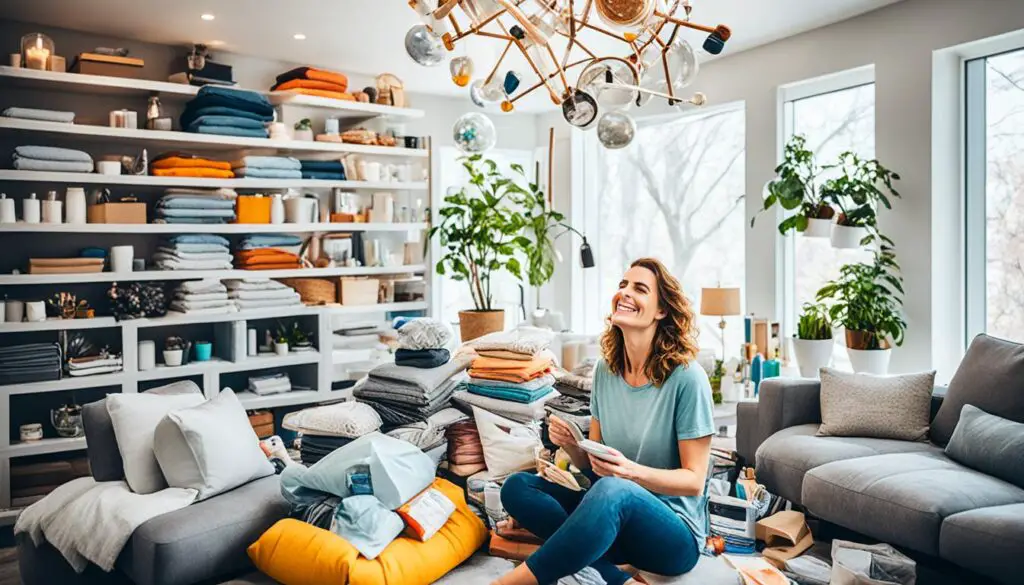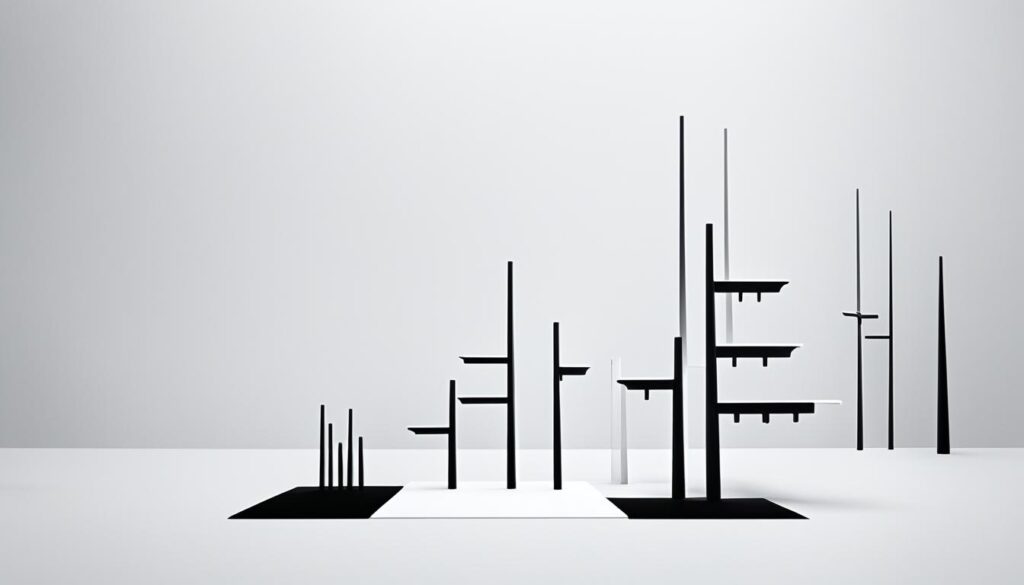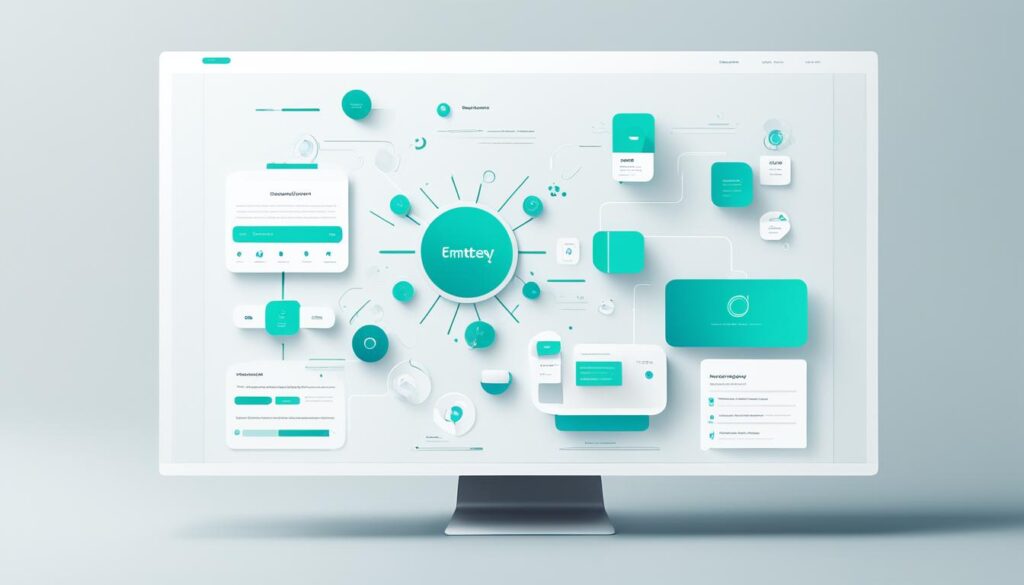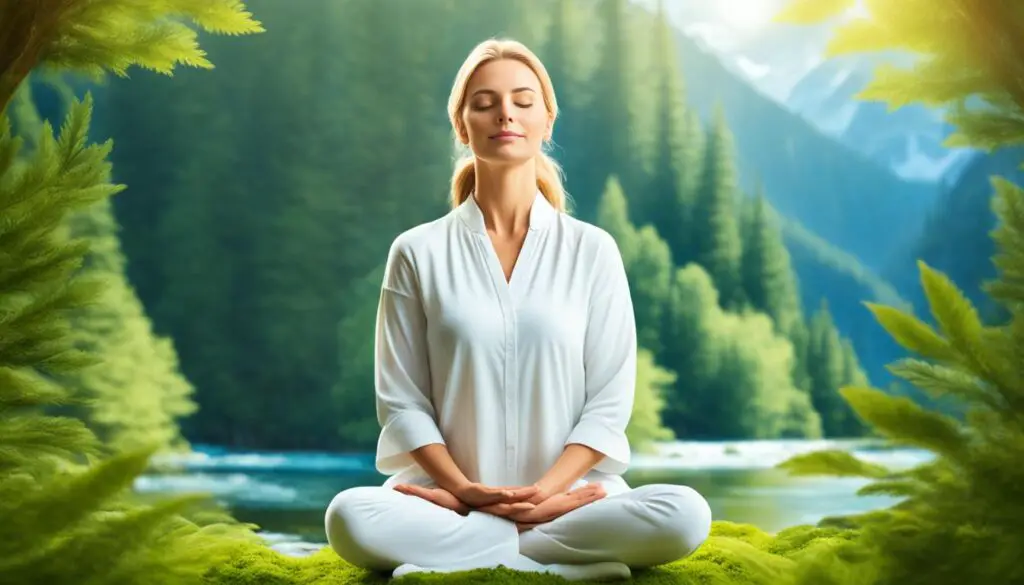O Minimalism is an lifestyle who seeks simplicity and the reduction of excess in all areas of life. By adopting the Minimalism, it is possible to enjoy a series of benefits, such as greater inner peace, less stress and a lighter life. In this guide, I'll show you how to get started with Minimalism in an easy way, focusing on the principles and steps to adopt this lifestyle.
Main points covered:
- Understand what minimalism is and how it can transform your life;
- Discover the benefits of adopting one minimalist lifestyle;
- Learn how to take your first steps towards minimalism;
- Receive practical tips to declutter your home and your mind;
- Understand how to simplify tech and learn to say no;
- Find out how to accumulate experiences and control the mind;
- Learn to let go and live in a lighter and more meaningful way.
If you are tired of the stress and rush of everyday life, minimalism could be the solution to a more peaceful and balanced life. Follow the tips in this guide and discover how to easily start minimalism and transform your routine.
What is minimalism?
Minimalism isn't just about having less stuff or living out of a small suitcase, it's about getting rid of excess and focusing on what really is. very important and bring felicidade. It's a way to simplify life, eliminating unnecessary commitments, worries and obligations. The goal is to have more time and space for what really matters.
benefits of minimalism
Living with less and adopting one minimalist lifestyle brings a series of benefits. Among them are:
- Feeling of peace and tranquility;
- Greater mental clarity;
- Stress reduction;
- Greater focus on important activities;
- More free time;
- Financial savings;
- More organized and clean environment;
- A life more aligned with personal values.
When we live with less, we are able to eliminate distractions and focus on the essentials, which brings peace and tranquility to our daily lives. Mental clarity increases as we free ourselves from the weight of excess and rampant consumerism. Minimalism also reduces stress, as we let go of what is not necessary and focus on the activities that really matter.
More free time is another benefit of minimalism, as we don't spend time and energy caring for and organizing a large number of belongings. Furthermore, minimalism helps us save financially, as we buy less and avoid waste. With fewer objects, our environment becomes more organized and cleaner, which contributes to a feeling of tranquility.
When we adopt a minimalist lifestyle, we also live in a way that is more aligned with our personal values. We value experiences and meaningful relationships instead of seeking satisfaction in material things. Minimalism allows us to focus on what really matters and live a more satisfying and authentic life.
If you want to enjoy these benefits and adopt a lifestyle minimalist, keep following this guide to discover the steps and tips to get started with minimalism in an easy way.

| Benefits of Minimalism |
|---|
| Feeling of peace and tranquility |
| Greater mental clarity |
| Stress reduction |
| Greater focus on important activities |
| More free time |
| financial economy |
| More organized and cleaner environment |
| A life more aligned with personal values |
Steps to adopt minimalism
To adopt minimalism, it is important to follow some steps. First, start piecemeal, starting with your closet and sorting your clothes into frequently worn, rarely worn, and never worn categories. Reflect on the usefulness of each item and let go of what is not essential.
| Steps | Overview |
|---|---|
| 1. Sort your clothes | Divide your clothes into three categories: frequently worn, rarely worn, and never worn. Evaluate the importance and usefulness of each item. |
| 2. Let go of what is not essential | Get rid of clothes that are not essential and do not add value to your life. Donate or sell items in good condition. |
| 3. Organize other areas of the house | Repeat the sorting process and detachment in other areas of the house, such as the pantry, bedroom and living room. |
| 4. Evaluate your commitments | Analyze your daily commitments and evaluate which ones are really essential and bring value to your life. Make space for what's important. |
Adopting minimalism is a gradual process. As you become more familiar with the minimalist lifestyle, you can apply the steps to other areas of your life. Remember that minimalism is not about depriving yourself, but rather about freeing yourself from excess and focusing on what really matters.

365 Stoic Reflections: ally your mind with the power of stoicism
Deepen your knowledge of Stoic philosophy and learn to apply its principles in all areas of your life. A daily journey of self-transformation and personal growth.
BUY NOW

Tips for decluttering
When starting out with minimalism, it's important to declutter your home and get rid of what you no longer need. Here are some essential tips to help you with this process:
- Question the usefulness of each item: Before deciding whether to keep or discard an object, ask yourself whether it really has any practical or emotional value. If the answer is no, it's time to let go.
- Donate or sell what is no longer needed: What no longer serves you can be useful to other people. Consider donating to charity or selling items in good condition.
- Separate what you have doubts about and store it temporarily: If you are in doubt about an object, place it in a separate box and store it for a set period of time. If you don't feel the need or lack of it, it's a sign that you can get rid of it.
- Control future purchases: Avoid accumulating more unnecessary things by controlling the purchases you make. Ask yourself if you really need that item before purchasing it.
With these tips, you'll be on your way to decluttering your home and adopting a minimalist lifestyle.
| Benefits of Decluttering |

|
|---|---|
| Greater space and organization | ✔ |
| Less stress and anxiety | ✔ |
| Greater mental clarity | ✔ |
| Better use of resources | ✔ |
Simplify technology
A tech can be a huge source of distraction and stress. To adopt minimalism, it is important to simplify the tech and reduce the number of electronic devices. Assess which devices are really necessary and eliminate excess. Disconnect from technology at specific times to have distraction-free time.

Nowadays, we are constantly connected to our smartphones, tablets, laptops and other electronic devices. Although technology has numerous advantages, such as facilitating communication and access to information, it can also overload our minds and take us away from the present.
When adopting minimalism, a mindful approach to technology is essential. Start by evaluating which devices are truly essential to your personal and professional life. Do you really need a tablet, a smartwatch and a laptop? Identify devices that perform similar functions and choose just one or two of them.
Additionally, evaluate your use of apps and social media. The time we spend surfing the web can easily become a source of distraction and anxiety. Set limits on the time you dedicate to these activities and disconnect from these technologies at specific times of your day.
A good practice to adopt is to create periods of time free from technology, in which you are disconnected and take the opportunity to engage in offline activities, such as reading a book, exercising or simply contemplating nature.
Evaluate your relationship with technology
Another important aspect is to evaluate your emotional relationship with technology. We often feel compelled to check our devices constantly for fear of missing something important or out of habit. Ask yourself: Is technology helping me or hurting me?
“Technology becomes harmful when it takes us away from present and stops us from living experiences authentic.”
By simplifying technology, you can enjoy the benefits of minimalism, such as greater mental clarity, reduced stress, and a deeper connection with the present. Remember that technology should be a tool that helps us live better, not a burden that weighs us down.
Tips for simplifying technology:
- Assess which devices are really necessary and eliminate excess.
- Set limits on time spent on apps and social media.
- Create periods of technology-free time.
- Practice switching off at specific times in your day.
- Assess your emotional relationship with technology and make adjustments if necessary.
| Device | Frequent Use | Use Rarely | Never Used |
|---|---|---|---|
| Smartphone | X | ||
| Tablet | X | ||
| Laptop | X | ||
| Smartwatch | X |
learn to say no
An important part of minimalism is learning to say no. Value your time and energy, saying no to activities and commitments that are not essential or that do not bring happiness. Prioritize what really matters and focus on your main goals. Being selective and focused allows for a life with more quality and less stress.
Learning to say no is essential to creating space in your life for what really matters. By defining your limits and priorities, you will be able to direct your energy towards the things that truly bring satisfaction and quality of life.
“Saying no is an exercise in self-knowledge and self-respect. It’s understanding that my time, my energy and my choices are valuable and should be directed towards my own happiness.” – Ana Silva
To learn how to say no effectively, it is important:
- Know your values and priorities: By understanding what is really important to you, it will be easier to make decisions and say no to activities that are not aligned with your goals.
- Set limits: Know how far you are willing to commit and learn to say no when you feel like you are exceeding those limits.
- Practice assertive communication: Find ways to express your negative in a respectful and clear way, avoiding unnecessary justifications or excuses.
- Constantly review your priorities: Sometimes you need to reevaluate your priorities and adjust your commitments. Be open to rethinking your choices and saying no when necessary.

When you learn to say no, you are taking an important step towards a life with more quality and balance. Minimalism teaches us to direct our attention and energy to what really matters, prioritizing what brings true happiness and fulfillment.
| Benefits of learning to say no: |
|---|
| Greater control over your life and time |
| Reducing stress and overload |
| Ability to concentrate on the most important activities |
| Improving the quality of relationships and interactions |
| Increased self-esteem and self-confidence |
Accumulate experiences
Minimalism encourages valuing experiences over material things. Focus on experiencing moments and activities that add to your life and bring learning and personal growth. Memories and experiences are lasting and more valuable than owning many material objects.

When we adopt a minimalist lifestyle, we seek to fill our days with experiences that bring us satisfaction and joy, instead of clinging to material goods. Accumulating experiences allows us to create meaningful memories, learn new things and expand our horizons.
Instead of spending money on objects that will soon become expendable, we can invest in moments that provide us with lasting happiness. This could include traveling to destinations we've always wanted to visit, participating in activities that challenge us and help us grow as a person, or even spending more time with the people we love.
Experiences enrich us in ways that material things never can. They make us more aware, inspire us and help us build a more meaningful life.
By accumulating experiences instead of objects, we are also creating a lighter, more flexible lifestyle. Without the worry of maintaining and taking care of an excessive amount of things, we can feel freer and more available to take advantage of the opportunities that come our way.
Furthermore, experiences are valuable not only when we live them, but also in the moments we remember them. Memories of past experiences can bring joy and satisfaction even years later. They connect us with our history and help us value the special moments we have already experienced.
Benefits of accumulating experiences:
- Lasting memories;
- Learning and personal growth;
- Sustainable happiness;
- Flexibility and freedom;
- Connection to personal history.
Therefore, when adopting minimalism into your lifestyle, remember that accumulating experiences is as important as letting go of material things. Cherish moments, seek new experiences and build memories that enrich your life and connect you with what truly matters.
Control the mind
In minimalism, it is essential to learn to control your mind and direct your focus to the present. Avoid worrying excessively about the past or the future and focus on what is really important today and now.
An effective practice to achieve this mind control It's meditation. Take a few minutes out of your day to calm your mind and be present in the present moment. Meditation helps cultivate mindfulness and provides greater clarity and tranquility.
Furthermore, learning to appreciate the little things in life is essential in minimalism. Be aware and grateful for what you have, avoiding the constant desire for more.
Appreciate every moment. Life is a succession of fleeting moments, and it is in the present that we find true peace and happiness.
Connect with nature, enjoy a meal mindfully, enjoy the sound of falling rain or the smell of fresh coffee in the morning. Cherish every little moment and discover the beauty and simplicity they can bring.
Controlling the mind and being present are fundamental aspects of minimalism, as they allow for a better understanding of oneself, greater clarity in decisions and a more meaningful life.

| Benefits of mind control in minimalism |
|---|
| Greater mental clarity |
| Stress reduction |
| Greater focus on the present |
| Increased inner peace |
Learn to let go
Learning to let go is fundamental to minimalism. We often become attached to objects because of their sentimental value, but it is important to understand that the memory is in us and not in the objects. Take photos or keep records of objects before getting rid of them to save memories. Learn to value the moment and experiences over material things.
Conclusion
Minimalism is a way to simplify life and seek more peace and mental clarity. By adopting minimalism, you can enjoy a series of benefits and live in a way that is more aligned with your personal values. Follow the steps and tips presented in this guide to getting started with minimalism easily and transform your life.
By getting rid of excess and focusing on what really matters, you will make space for a lighter and more organized life. Minimalism allows for a greater appreciation of simple things and meaningful experiences, valuing personal relationships, free time and relaxation more. quality of life.
Adopting a minimalist lifestyle also contributes to sustainability and preservation of the environment, as we reduce our consumption and waste. Furthermore, minimalism helps us get out of the mentality of having and focus on being, prioritizing personal growth, authenticity and the search for genuine happiness.
Start your journey into minimalism today by following the guidance in this guide. Remember that minimalism is an ongoing and personal process, so make adjustments that make sense for you. Discover what is essential in your life and enjoy a new way of living.
FAQ
Q: What is minimalism?
A: Minimalism is a lifestyle that seeks simplicity and reducing excess in all areas of life. It's a way of simplifying life, eliminating unnecessary commitments, worries and obligations, focusing on what's really important and brings happiness.
Q: What are the benefits of minimalism?
A: By adopting minimalism, it is possible to enjoy a series of benefits, such as greater inner peace, less stress, greater mental clarity, greater focus on important activities, more free time, financial savings, a more organized and clean environment, and a better life. more aligned with personal values.
Q: What are the steps to adopting minimalism?
A: To adopt minimalism, it is important to follow some steps, such as starting small, decluttering your home, reducing the number of electronic devices, learning to say no, accumulating experiences, controlling your mind and learning to let go.
Q: What are your tips for decluttering?
A: Some tips for decluttering include questioning the usefulness of each item, donating or selling what is no longer needed, separating what you have doubts about and storing it temporarily, and controlling future purchases, avoiding accumulating more things.
Q: How to simplify technology in minimalism?
A: To simplify technology, evaluate which devices are truly necessary and eliminate excess. Disconnect from technology at specific times to have distraction-free time.
Q: How to learn to say no to minimalism?
A: In minimalism, it is important to value your time and energy, saying no to activities and commitments that are not essential or that do not bring happiness. Prioritize what really matters and focus on your main goals.
Q: How to accumulate experiences in minimalism?
A: Minimalism encourages valuing experiences over material things. Focus on experiencing moments and activities that add to your life and bring learning and personal growth.
Q: How to control the mind in minimalism?
A: In minimalism, it is important to control the mind and focus on the present. Practice meditation to calm your mind and be more present. Appreciate the little things in life and be grateful for what you have, avoiding the constant desire for more.
Q: How to learn to let go in minimalism?
A: Learning to let go is fundamental to minimalism. Take photos or keep records of objects before getting rid of them to save memories. Learn to value the moment and experiences over material things.
Q: How do I get started with minimalism?
A: Minimalism is a way to simplify life and seek more peace and mental clarity. Follow the steps and tips presented in this guide to getting started with minimalism easily and transform your life.






